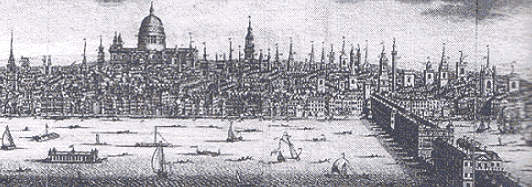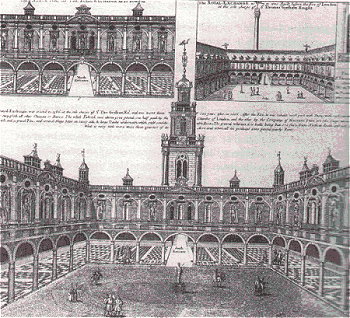

History by stories, diaries, documents and travel descriptions - this is Maureen
Waller's recipe for making alive the London of 1700.
She takes the reader on a guided tour of the city during King William III's and Queen Mary II's
reign. London at the end of the 17th century was one of the largest and most magnificent cities
in Europe owing its beauty to the architecture of Inigo Jones and Christopher Wren. They were
the ones who planned and designed many of the 9000 new houses in the city's square miles
after the Great Fire of 1666, thus contributing to its skyline of churches and London Bridge.
 London's fame was also based on the Royal Exchange (picture below), Europe's largest institution of its kind
and the centre of the financial and mercantile world.
London's fame was also based on the Royal Exchange (picture below), Europe's largest institution of its kind
and the centre of the financial and mercantile world.
 Business and financial transactions were, however, prepared in the newly-established coffee-houses,
competitors of the public ale-houses (pubs).
One of its most famous was Edward Lloyd's coffee-house. Ships and their cargoes were actually auctioned
there in 1700. Lloyd issued handwritten 'ships' lists' which developed into 'Lloyd's News' and eventually into
'Lloyd's List'.
Business and financial transactions were, however, prepared in the newly-established coffee-houses,
competitors of the public ale-houses (pubs).
One of its most famous was Edward Lloyd's coffee-house. Ships and their cargoes were actually auctioned
there in 1700. Lloyd issued handwritten 'ships' lists' which developed into 'Lloyd's News' and eventually into
'Lloyd's List'.
But London was not only gold that glitters. Crime, drunkenness, gambling, prostitutions and other vices thrived. All this was compounded
by the non-exsitence of a police-force as this was considered 'un-English'. People's life expectancy
was low due to tuberculosis, smallpox and venereal diseases which again was aggravated by a lack of
hospitals, London's dreary weather and pollution by coal smoke and sewage.
Women's lib was not even thought of - on the contrary marriages in upper classes were arranged between parents
of the couple and their lawyers. The question was not love and romance, but 'What will she bring? How many acres?
How much ready coin?' In one of Henry Fielding's satires, a character deliberates: I never saw my lady...
till an hour before our marriage. I made my addresses to her father, her father to his lawyer, the lawyer to my estate...
the bargain was struck. What need have young people of addressing, or anything, till they come to undressing?
|


 London's fame was also based on the Royal Exchange (picture below), Europe's largest institution of its kind
and the centre of the financial and mercantile world.
London's fame was also based on the Royal Exchange (picture below), Europe's largest institution of its kind
and the centre of the financial and mercantile world.
 Business and financial transactions were, however, prepared in the newly-established coffee-houses,
competitors of the public ale-houses (pubs).
One of its most famous was Edward Lloyd's coffee-house. Ships and their cargoes were actually auctioned
there in 1700. Lloyd issued handwritten 'ships' lists' which developed into 'Lloyd's News' and eventually into
'Lloyd's List'.
Business and financial transactions were, however, prepared in the newly-established coffee-houses,
competitors of the public ale-houses (pubs).
One of its most famous was Edward Lloyd's coffee-house. Ships and their cargoes were actually auctioned
there in 1700. Lloyd issued handwritten 'ships' lists' which developed into 'Lloyd's News' and eventually into
'Lloyd's List'.